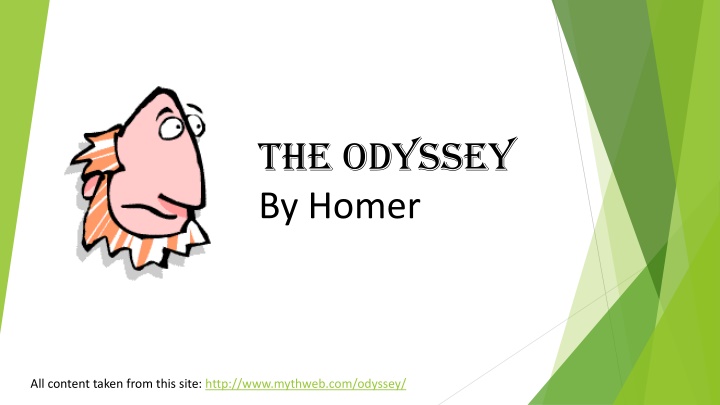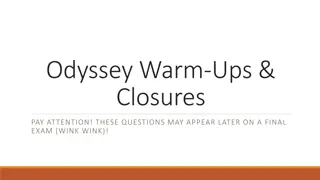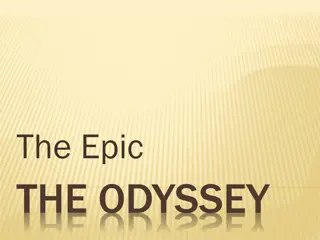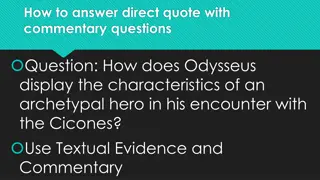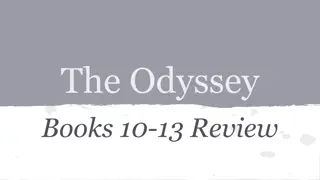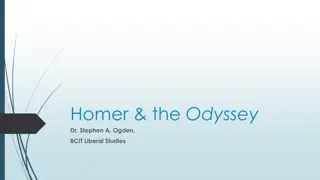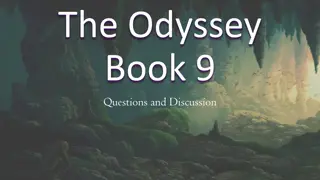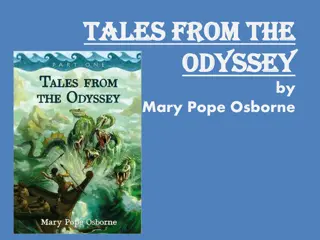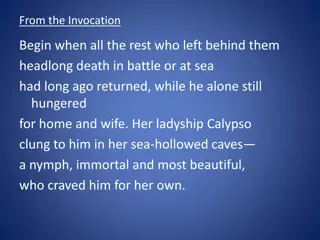The Odyssey by Homer: A Summary of Books One to Five
In the epic poem "The Odyssey" by Homer, we follow the journey of Odysseus and his son Telemachus as they navigate through challenges and adventures after the Trojan War. It begins with the gods conspiring to help Odysseus return home, while Telemachus seeks guidance from King Nestor and Menelaus about his missing father. Menelaus reveals details about Odysseus' plight with Calypso, leading to Zeus' intervention to facilitate Odysseus' journey back home.
Download Presentation

Please find below an Image/Link to download the presentation.
The content on the website is provided AS IS for your information and personal use only. It may not be sold, licensed, or shared on other websites without obtaining consent from the author.If you encounter any issues during the download, it is possible that the publisher has removed the file from their server.
You are allowed to download the files provided on this website for personal or commercial use, subject to the condition that they are used lawfully. All files are the property of their respective owners.
The content on the website is provided AS IS for your information and personal use only. It may not be sold, licensed, or shared on other websites without obtaining consent from the author.
E N D
Presentation Transcript
The Odyssey By Homer All content taken from this site: http://www.mythweb.com/odyssey/
Background In the tenth year of the Trojan War, the Greeks tricked the enemy into bringing a colossal wooden horse within the walls of Troy. The Trojans had no idea that Greek soldiers were hidden inside, under the command of Odysseus. That night they emerged and opened the city gates to the Greek army. Troy was destroyed. Now it was time for Odysseus and the other Greeks to return to their kingdoms across the sea. Here begins the tale of the Odyssey, as sung by the blind minstrel Homer.
Book One "Oh Goddess of Inspiration, help me sing of wily Odysseus, that master of schemes!" So Homer begins his epic, though the hero himself is still offstage. We are treated to a glimpse of life among the supreme gods on Mount Olympus. Urged on by Athena, the goddess of war, they decide that Odysseus has been marooned too long on the island of the nymph, Calypso.
Book Two Meanwhile, the mansion of Odysseus is infested with suitors for the hand of his wife Penelope. Everyone assumes Odysseus is dead. His son Telemachus calls an assembly to ask for help, and Zeus sends an omen of the suitors' doom. Two eagles swoop down, tearing throats and necks with their talons. Afterwards Telemachus sets sail for the mainland to seek news of his father
Book Three Telemachus consults King Nestor, who led a contingent in the Trojan War when he was in his nineties. Nestor tells what he knows of the Greeks' return from Troy: "It started out badly because of Athena's anger. Half the army, your father included, stayed behind at Troy to try to appease her. The rest of us made it home safely -- all except Menelaus, who was blown off course to Egypt, where he remained for seven years. Seek advice from Menelaus. I'll lend you a chariot to travel to his kingdom."
Book Four Menelaus tells what he learned of Odysseus while stranded in Egypt after the war. He was advised by a goddess to disguise himself and three members of his crew in seal pelts and then pounce on the Old Man of the Sea. If they could hold him down while he transformed himself into various animals and shapes, he would send them on their homeward way and give news of their companions. Menelaus did as instructed and was informed that Odysseus was presently being held against his will by the nymph Calypso.
Book Five Zeus, the King of the Gods, sends his messenger Hermes skimming over the waves on magic sandals to Calypso's island. Though the goddess isn't happy about it, she agrees to let Odysseus go. But the raft on which he sets sail is destroyed by his enemy, the god Poseidon, who lashes the sea into a storm with his trident. Odysseus barely escapes with his life and washes ashore days later, half-drowned. He staggers into an olive thicket and falls asleep.
Book Six Odysseus awakens to the sound of maidens laughing. Princess Nausicaa of the Phaeacians has come down to the riverside to wash her wedding dress. Now she and her handmaids are frolicking after the chore. Odysseus approaches as a suppliant, and Nausicaa is kind enough to instruct him how to get the king's help in returning to his home. Odysseus follows her into town.
Book Seven Odysseus stops on the palace threshold, utterly dazzled. The very walls are covered in shining bronze and trimmed with lapis lazuli. The blacksmith god Hephaestus has even provided two brazen hounds to guard the entrance. Odysseus goes right up to the queen and puts his case to her as a suppliant. The king knows better than to refuse hospitality to a decent petitioner. He invites Odysseus to the banquet which is in progress and promises him safe passage home after he has been suitably entertained.
Book Eight The next day is declared a holiday in honor of the guest, whose name the king still does not know. An athletic competition is held, with foot races, wrestling and the discus. Odysseus is invited to join in but begs off, prompting someone to suggest that he lacks the skills. Angered, he takes up a discus and throws it with such violence that everyone drops to the ground. That night at a banquet, as the court bard entertains with songs of the Trojan War, Odysseus is heard sobbing. "Enough!" shouts the king. "Our friend finds this song displeasing. Won't you tell us your name, stranger, and where you hail from?"
Book Nine "My name is Odysseus of Ithaca, and here is my tale since setting out from Troy. We sacked a city first off, but then reinforcements arrived and we lost many comrades. Next we visited the Lotus Eaters, and three of my crew tasted this strange plant. They lost all desire to return home and had to be carried off by force. On another island we investigated a cave full of goat pens. The herdsman turned out to be as big as a barn, with a single glaring eye in his forehead. This Cyclops promptly ate two of my men for dinner. We were trapped in the cave by a boulder in the doorway that only the Cyclops could budge, so we couldn't kill him while he slept. Instead we sharpened a pole and used it to gouge out his eye. We escaped his groping by clinging to the undersides of his goats."
Book Ten "Next we met the Keeper of the Winds, who sent us on our way with a steady breeze. He'd given me a leather bag, which my crew mistook for booty. They opened it and released a hurricane that blew us back to where we'd started. We ended up among the Laestrygonians, giants who bombarded our fleet with boulders and gobbled down our shipmates. The few survivors put in at the island of the enchantress Circe. My men were entertained by her and then, with a wave of her wand, turned into swine. Hermes the god gave me an herb that protected me. Circe told me that to get home I must travel to the land of Death."
Book Eleven 'At the furthest edge of Ocean's stream is the land to which all journey when they die. Here their spirits endure a fleshless existence. They can't even talk unless re-animated with blood.' Accordingly, I did as Circe instructed, bleeding a sacrificed lamb into a pit. Tiresias, the blind prophet who had accompanied us to Troy, was the soul I had to talk to. So I held all the other shades at bay with my sword until he had drunk from the pit. He gave me warnings about my journey home and told me what I must do to ensure a happy death when my time came. I met the shades of many famous women and heroes, including Achilles, best fighter of the Greeks at Troy.
Book Twelve "At sea once more we had to pass the Sirens, whose sweet singing lures sailors to their doom. I had stopped up the ears of my crew with wax, and I alone listened while lashed to the mast, powerless to steer toward shipwreck. Next came Charybdis, who swallows the sea in a whirlpool, then spits it up again. Avoiding this we skirted the cliff where Scylla exacts her toll. Each of her six slavering maws grabbed a sailor and wolfed him down. Finally we were becalmed on the island of the Sun. My men disregarded all warnings and sacrificed his cattle, so back at sea Zeus sent a thunderbolt that smashed the ship. I alone survived, washing up on the island of Calypso."
Book Thirteen When Odysseus has finished his tale, the king orders him sped to Ithaca. The sailors put him down on the beach asleep. Athena casts a protective mist about him that keeps him from recognizing his homeland. Finally the goddess reveals herself and dispels the mist. In joy Odysseus kisses the ground. Athena transforms him into an old man as a disguise. Clad in a filthy tunic, he goes off to find his faithful swineherd, as instructed by the goddess.
Book Fourteen Eumaeus the swineherd welcomes the bedraggled stranger. He throws his own bedcover over a pile of boughs as a seat for Odysseus, who does not reveal his identity. Observing Zeus's commandment to be kind to guests, Eumaeus slaughters a prime boar and serves it with bread and wine. Odysseus, true to his fame as a smooth- talking schemer, makes up an elaborate story of his origins. That night the hero sleeps by the fire under the swineherd's spare cloak, while Eumaeus himself sleeps outside in the rain with his herd.
Book Fifteen Athena summons Telemachus home and tells him how to avoid an ambush by the suitors. Meanwhile back on Ithaca, Odysseus listens while the swineherd Eumaeus recounts the story of his life. He was the child of a prosperous mainland king, whose realm was visited by Phoenician traders. His nursemaid, a Phoenician herself, had been carried off by pirates as a girl and sold into slavery. In return for homeward passage with her countrymen, she kidnapped Eumaeus. He was bought by Odysseus' father, whose queen raised him as a member of the family.
Book Sixteen Telemachus evades the suitors' ambush. Following Athena's instructions, he proceeds to the farmstead of Eumaeus. There he makes the acquaintance of the tattered guest and sends Eumaeus to his mother to announce his safe return. Athena restores Odysseus' normal appearance, enhancing it so that Telemachus takes him for a god. "No god am I," Odysseus assures him, "but your own father, returned after these twenty years." They fall into each other's arms. Later they plot the suitors' doom. Concerned that the odds are fifty-to- one, Telemachus suggests that they might need reinforcements. "Aren't Zeus and Athena reinforcement enough?" asks Odysseus.
Book Seventeen: Disguised once more as an old beggar, Odysseus journeys to town. On the trail he encounters an insolent goatherd named Melantheus, who curses and tries to kick him. At his castle gate, the hero is recognized by a decrepit dog that he raised as a pup. Having seen his master again, the old hound dies. At Athena's urging Odysseus begs food from the suitors. One man, Antinous, berates him and refuses so much as a crust. He even hurls his footstool at Odysseus, hitting him in the back. This makes even the other suitors nervous, for sometimes the gods masquerade as mortals to test their righteousness
Book Eighteen Now a real beggar shows up at the palace and warns Odysseus off his turf. This man, Irus, is always running errands for the suitors. Odysseus says that there are pickings enough for the two of them, but Irus threatens fisticuffs and the suitors egg him on. Odysseus rises to the challenge and rolls up his tunic into a boxer's belt. The suitors goggle at the muscles revealed. Not wishing to kill Irus with a single blow, Odysseus breaks his jaw instead. Another suitor, Eurymachus, marks himself for revenge by trying to hit Odysseus with a footstool as Antinous had done.
Book Nineteen Odysseus has a long talk with his queen Penelope but does not reveal his identity. Penelope takes kindly to the stranger and orders her maid Eurycleia to bathe his feet and anoint them with oil. Eurycleia, who was Odysseus' nurse when he was a child, notices a scar above the hero's knee. Odysseus had been gored by a wild boar when hunting on Mount Parnassus as a young man. The maid recognizes her master at once, and her hand goes out to his chin. But Odysseus silences her lest she give away his plot prematurely.
Book Twenty The next morning Odysseus asks for a sign, and Zeus sends a clap of thunder out of the clear blue sky. A servant recognizes it as a portent and prays that this day be the last of the suitors' abuse. Odysseus encounters another herdsman. Like the swineherd Eumaeus, this man, who tends the realm's cattle, swears his loyalty to the absent king. A prophet, an exiled murderer whom Telemachus has befriended, shares a vision with the suitors: "I see the walls of this mansion dripping with your blood." The suitors respond with gales of laughter.
Book Twenty-One Penelope now appears before the suitors in her glittering veil. In her hand is a stout bow left behind by Odysseus when he sailed for Troy. "Whoever strings this bow," she says, "and sends an arrow straight through the sockets of twelve ax heads lined in a row -- that man will I marry." The suitors take turns trying to bend the bow to string it, but all of them lack the strength. Odysseus asks if he might try. The suitors refuse, fearing that they'll be shamed if the beggar succeeds. But Telemachus insists and his anger distracts them into laughter. As easily as a bard fitting a new string to his lyre, Odysseus strings the bow and sends an arrow through the ax heads. At a sign from his father, Telemachus arms himself and takes up a station by his side.
Book Twenty-Two Antinous, ringleader of the suitors, is just lifting a drinking cup when Odysseus puts an arrow through his throat. The goatherd sneaks out and comes back with shields and spears for the suitors, but now Athena appears. She sends the suitors' spear thrusts wide, as Odysseus, Telemachus and the two faithful herdsmen strike with volley after volley of lances. They finish off the work with swords. Those of the housemaids who consorted with the suitors are hung by the neck in the courtyard, while the treacherous goatherd is chopped to bits.
Book Twenty-Three The mansion is purged with fire and brimstone. Odysseus tells everyone to dress in their finest and dance, so that passers-by won't suspect what's happened. Even Odysseus could not hold vengeful kinfolk at bay. Penelope still won't accept that it's truly her husband without some secret sign. She tells a servant to make up his bed in the hall. "Who had the craft to move my bed?" storms Odysseus. "I carved the bedpost myself from the living trunk of an olive tree and built the bedroom around it." Penelope rushes into his arms.
Book Twenty-Four The next morning Odysseus goes upcountry to the vineyard where his father, old King Laertes, labors like a peasant. Meanwhile, the kin of the suitors have gathered at the assembly ground, where the father of the suitor Antinous fires them up for revenge. Odysseus, his father and Telemachus meet the challenge. Laertes casts a lance through the helmet of Antinous' father, who falls to the ground in a clatter of armor. But the fighting stops right there. Athena tells the contending parties to live together in peace down through the years to come.
